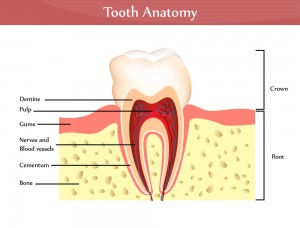 Parents, need a break? Enjoy a night to yourselves while the Livonia Parks and Recreation Department gets your kids up and moving. Exercise is important and today too many people sit in front of the computer or TV for hours at a time. Looking for something to get your kids moving? Your Livonia, MI dentist Dr. James Stewart suggests Kids Night Out! and Rock Wall Climbing Social! this coming Friday at the Community Recreation Center in Livonia, MI.
Parents, need a break? Enjoy a night to yourselves while the Livonia Parks and Recreation Department gets your kids up and moving. Exercise is important and today too many people sit in front of the computer or TV for hours at a time. Looking for something to get your kids moving? Your Livonia, MI dentist Dr. James Stewart suggests Kids Night Out! and Rock Wall Climbing Social! this coming Friday at the Community Recreation Center in Livonia, MI.
Your Tongue Is An Interesting Muscle
 Some people brush their tongues. Some people pierce their tongues. Some people don’t pay any attention to their tongues. Does your tongue affect your oral health? Find out by taking your Livonia, MI dentist, Dr. James Stewart’s true or false quiz below.
Some people brush their tongues. Some people pierce their tongues. Some people don’t pay any attention to their tongues. Does your tongue affect your oral health? Find out by taking your Livonia, MI dentist, Dr. James Stewart’s true or false quiz below.
Can Hydrogen Peroxide Be Used For Oral Care?
 Hydrogen peroxide is a staple in everyone’s bathroom cupboard. You probably remember your parents cleaning your cuts and scraped knees with hydrogen peroxide when you were a kid. You probably thought it was cool the way it foamed up when it came into contact with your cut. But what exactly is hydrogen peroxide and can it benefit your teeth? If you want to know more about hydrogen peroxide and dental health contact your Livonia, MI dentist, Dr. James Stewart, he will be happy to discuss the dental benefits associated with hydrogen peroxide.
Hydrogen peroxide is a staple in everyone’s bathroom cupboard. You probably remember your parents cleaning your cuts and scraped knees with hydrogen peroxide when you were a kid. You probably thought it was cool the way it foamed up when it came into contact with your cut. But what exactly is hydrogen peroxide and can it benefit your teeth? If you want to know more about hydrogen peroxide and dental health contact your Livonia, MI dentist, Dr. James Stewart, he will be happy to discuss the dental benefits associated with hydrogen peroxide.
Is Xylitol A Chemical?
 Xylitol is a100 percent natural sugar substitute derived from fruits, vegetables, mushrooms, berries, and lettuce. Your body also produces xylitol from other food sources. An average adult with a normal metabolism can produce up to 15 grams of xylitol a day. Xylitol is not a chemical like aspartame, Splenda® or sucralose, and although it may be difficult to tell the difference taste-wise, it contains 40 percent fewer calories than sugar. In today’s blog, your Livonia, MI dentist, Dr. James Stewart, will discuss how xylitol can benefit your dental health.
Xylitol is a100 percent natural sugar substitute derived from fruits, vegetables, mushrooms, berries, and lettuce. Your body also produces xylitol from other food sources. An average adult with a normal metabolism can produce up to 15 grams of xylitol a day. Xylitol is not a chemical like aspartame, Splenda® or sucralose, and although it may be difficult to tell the difference taste-wise, it contains 40 percent fewer calories than sugar. In today’s blog, your Livonia, MI dentist, Dr. James Stewart, will discuss how xylitol can benefit your dental health.
Electric Toothbrush or Manual: Which Should You Use?
 Did you know the electric toothbrush was invented in Switzerland in 1939? It wasn’t introduced to the U.S. until the1960s. Some of you reading this were probably born in that decade. Today, electric toothbrushes have risen in popularity. They are affordable and easy to use. Children tend to enjoy brushing with electric toothbrushes over manual ones. They find them fun and even say they tickle. There is an ongoing debate, however, as to whether they are more or less effective than a manual toothbrush. If you have questions regarding the use of electric toothbrushes your Livonia, MI dentist, Dr. James Stewart, will be happy to answer them for you.
Did you know the electric toothbrush was invented in Switzerland in 1939? It wasn’t introduced to the U.S. until the1960s. Some of you reading this were probably born in that decade. Today, electric toothbrushes have risen in popularity. They are affordable and easy to use. Children tend to enjoy brushing with electric toothbrushes over manual ones. They find them fun and even say they tickle. There is an ongoing debate, however, as to whether they are more or less effective than a manual toothbrush. If you have questions regarding the use of electric toothbrushes your Livonia, MI dentist, Dr. James Stewart, will be happy to answer them for you.
Misaligned Bite
 Does your child have a misaligned bite? The technical name for a misaligned bite or “bad bite” is malocclusion. Malocclusion can be caused by genetics, mouth breathing, or bad oral habits such as thumb sucking. Most people, children and adults, have some level of malocclusion, but nothing that usually warrants treatment. Research indicates that 90 percent of school-aged children present with some sort of malocclusion, but only 10 to 15 percent of those children require treatment. If your child’s bite appears misaligned, if they have trouble chewing or speaking, or are embarrassed to smile, your Livonia, MI dentist, Dr. James Stewart can evaluate their bite and recommend appropriate treatment that may help prevent future problems.
Does your child have a misaligned bite? The technical name for a misaligned bite or “bad bite” is malocclusion. Malocclusion can be caused by genetics, mouth breathing, or bad oral habits such as thumb sucking. Most people, children and adults, have some level of malocclusion, but nothing that usually warrants treatment. Research indicates that 90 percent of school-aged children present with some sort of malocclusion, but only 10 to 15 percent of those children require treatment. If your child’s bite appears misaligned, if they have trouble chewing or speaking, or are embarrassed to smile, your Livonia, MI dentist, Dr. James Stewart can evaluate their bite and recommend appropriate treatment that may help prevent future problems.
Tooth-Colored Fillings
 Were you one of those kids that dreaded going to the dentist? You did not want to find out that you had cavities and needed your teeth filled. Was it one of your greatest fears? Well, you were not alone. Over 90 percent of the population has cavities and 78 percent of the population experienced their first cavity before the age of 17. Not only did we not want to have our tooth drilled, or be trapped in the dentist chair for a long period of time, we didn’t want people to see our silver fillings when we opened our mouth. If you or your child needs a filling your Livonia, MI dentist, Dr. James Stewart, will be happy to discuss the pros and cons of tooth-colored filling materials.
Were you one of those kids that dreaded going to the dentist? You did not want to find out that you had cavities and needed your teeth filled. Was it one of your greatest fears? Well, you were not alone. Over 90 percent of the population has cavities and 78 percent of the population experienced their first cavity before the age of 17. Not only did we not want to have our tooth drilled, or be trapped in the dentist chair for a long period of time, we didn’t want people to see our silver fillings when we opened our mouth. If you or your child needs a filling your Livonia, MI dentist, Dr. James Stewart, will be happy to discuss the pros and cons of tooth-colored filling materials.
Understanding Tooth Anatomy
 When you visit your dentist, do you feel like you’re in the dark? You don’t need to know what’s going on. You open your mouth, say “Ah,” and your dentist takes it from there. He or she knows what they are doing and we trust our dentist. It may be helpful, however, to be familiar with the anatomy of a tooth in case you need to make a decision concerning treatment. In today’s blog, your Livonia, MI dentist, Dr. James Stewart, is going to explain the basics of tooth anatomy.
When you visit your dentist, do you feel like you’re in the dark? You don’t need to know what’s going on. You open your mouth, say “Ah,” and your dentist takes it from there. He or she knows what they are doing and we trust our dentist. It may be helpful, however, to be familiar with the anatomy of a tooth in case you need to make a decision concerning treatment. In today’s blog, your Livonia, MI dentist, Dr. James Stewart, is going to explain the basics of tooth anatomy.
Eating For Healthy Teeth
 Remember when you were a child, how much you loved candy, ice cream, and soda? The same goes for your kids, right? One of their baby teeth must’ve been a sweet tooth. Your parents probably told you back then that you were going to rot your teeth, and they were right. All of that sugar does encourage tooth decay. If you want your children to eat for healthy teeth, stock your refrigerator and cupboards with healthy foods and snacks. If you have questions regarding healthy foods and tooth health, your Livonia, MI dentist, Dr. James Stewart will be happy to explain the effect eating healthy has on your children’s teeth.
Remember when you were a child, how much you loved candy, ice cream, and soda? The same goes for your kids, right? One of their baby teeth must’ve been a sweet tooth. Your parents probably told you back then that you were going to rot your teeth, and they were right. All of that sugar does encourage tooth decay. If you want your children to eat for healthy teeth, stock your refrigerator and cupboards with healthy foods and snacks. If you have questions regarding healthy foods and tooth health, your Livonia, MI dentist, Dr. James Stewart will be happy to explain the effect eating healthy has on your children’s teeth.
Involve your Family in Excellent Oral Hygiene
 If anyone in your family has unhealthy teeth and gums, the domino effect on future oral and overall health is scarier than you may realize. Certain dangerous health conditions (heart disease, strokes, cancer, Alzheimer’s) are all linked to the bacteria which breed in your mouth. If you want to eradicate these “bad guys” so you and your family’s oral-systemic health is as good as it possible, you must keep up with your preventive dental care.
If anyone in your family has unhealthy teeth and gums, the domino effect on future oral and overall health is scarier than you may realize. Certain dangerous health conditions (heart disease, strokes, cancer, Alzheimer’s) are all linked to the bacteria which breed in your mouth. If you want to eradicate these “bad guys” so you and your family’s oral-systemic health is as good as it possible, you must keep up with your preventive dental care.
Explain the Purpose of Oral Hygiene
Most children aren’t likely to feel terribly excited about brushing their teeth. One of the most common complaints of patients who are also parents is how to inspire their children to properly clean their teeth without a huge struggle. Kids are naturally inquisitive, so try talking to them about the importance of dental health, and implications of neglect. “Do it because I said so,” doesn’t tend to go very far with our modern day American children. Capitalize on their natural intelligence by highlighting the reasons behind wanting them to floss and brush their teeth with care.


